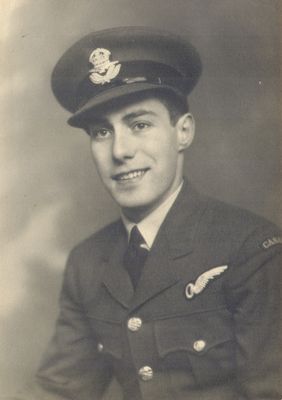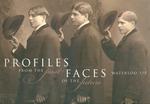Harold Beaupre
Harold Beaupre was a prisoner of war marching across Germany at
gunpoint when he finally could take no more. It was the winter of
1945 and having suffered two years of abuse and near starvation
Beaupre slumped to the ground.
When a German soldier told him to stand up or be shot, the broken young man from
Waterloo said, “Shoot.”
Two friends, seeing Beaupre in the desperate situation, picked him up by the arms and
carried him forward. Beaupre never knew who the soldiers were who saved his life that
day but he remained forever grateful.
This was the kind of story Beaupre would tell when he was asked about the Second
World War. Despite the horrors he experienced, Beaupre always focused on the men
who died and those who helped him.
Beaupre, who later prospered as a businessman in Uptown Waterloo, was quick to
remind people that of the forty young men who went to war from his Kitchener-Waterloo
Collegiate graduating class, only four survived.
A great loss for Beaupre happened on the morning of April 17, 1943 when the Lancaster
Bomber he was in was damaged by German gunfire. Pilot Glenn McNichol tried
valiantly to make it back to base with only two of four engines, but the aircraft finally fell
from the sky at 240 mph, and crashed into a house in France.
Miraculously, Beaupre and the crew survived but McNichol was killed instantly.
Beaupre, who helped a trapped gunner flee the wreckage, often told the story of the
heroic pilot. When his son was born after the war, Beaupre named the boy Glenn.
After the crash in occupied France, Beaupre was taken to a prisoner of war camp near the
Polish border called Stalag Luft 3. The camp was made famous when seventy-four
prisoners escaped in 1944. Beaupre watched as soldiers shot fifty of the men who were
recaptured.
On May 2, 1945 Beaupre and his fellow prisoners were liberated. “I was sure I would be
cool, calm and collected,” he said. “But I screamed my head off when we were liberated
by the British 8th Army.”
Beaupre returned to Waterloo, married his high school sweetheart and began working in
his father’s store on King Street called Beaupre Paint and Wallpaper. He took over the
business in 1946 and eventually changed the name to Beaupre Interiors.
Beaupre ran the business for thirty years in several downtown locations before retiring in
1979 and opening up another shop called Beaupre Stamps. The new business allowed
Beaupre to pursue his passion for collecting stamps on a more full-time basis. “I look at
the stamps and if it’s a country, my mind takes me there,” he said once. “Each stamp tells
a story.”
Beaupre continued to tell the stories of war until he died in 2002 at the age of eighty three. His stories paid tribute to the men who lost their lives to protect our freedom but
they also reminded society about the cost of war. “. . . it was a bad time and I saw a lot of
things,” said Beaupre on the fiftieth anniversary of his release. “We certainly don’t need
another war.”
Photo courtesy of Margaret Beaupre.
Harold Beaupre (Waterloo 150 Profile)
Description
- Creator
- Gallagher, Beth, Author
- Media Type
- Text
- Image
- Description
- To celebrate Waterloo's 150th anniversary, the Waterloo Public Library published a book called "Profiles from the Past, Faces of the Future." This book featured 150 profiles of people who helped make Waterloo what it is today. This is the digitized profile for Walter Bean.
- Notes
- Please visit the Waterloo Public Library to enquire about physical copies of "Profiles from the Past, Faces of the Future."
The Waterloo 150 project was funded by a grant from the Waterloo Regional Heritage Foundation. Beth Gallagher wrote the profiles with the assistance of many research volunteers. Information for the profiles was gathered from a variety of sources from the community and the Ellis Little Local History Room. Notable sources include the Ellis Little Papers, newspaper clippings, local magazines and books. - Place of Publication
- Waterloo, Ontario
- Date of Publication
- 2007
- Subject(s)
- Personal Name(s)
- Beaupre, Harold ; McNichol, Glen
- Corporate Name(s)
- Beaupre Paint and Wallpaper ; Beaupre Interiors ; Beaupre Stamps
- Language of Item
- English
- Geographic Coverage
-
-
Ontario, Canada
Latitude: 43.4668 Longitude: -80.51639
-
- Copyright Statement
- Uses other than research or private study require the permission of the rightsholder(s). Responsibility for obtaining permissions and for any use rests exclusively with the user.
- Contact
- Waterloo Public LibraryEmail:askus@wpl.ca
Website:
Agency street/mail address:35 Albert Street, Waterloo, Ontario, Canada, N2L 5E2
- Full Text




